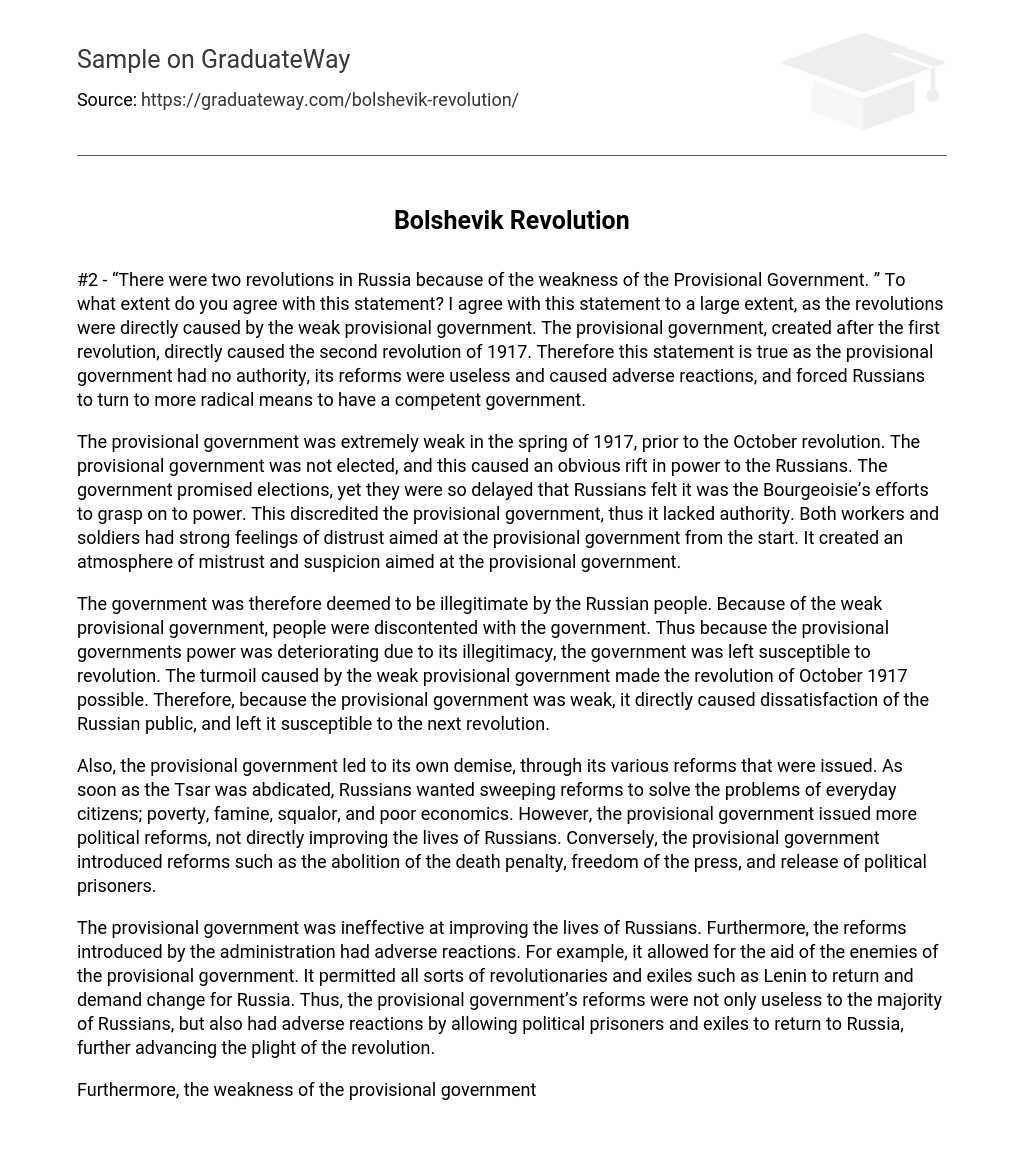#2 – “There were two revolutions in Russia because of the weakness of the Provisional Government. ” To what extent do you agree with this statement? I agree with this statement to a large extent, as the revolutions were directly caused by the weak provisional government. The provisional government, created after the first revolution, directly caused the second revolution of 1917. Therefore this statement is true as the provisional government had no authority, its reforms were useless and caused adverse reactions, and forced Russians to turn to more radical means to have a competent government.
The provisional government was extremely weak in the spring of 1917, prior to the October revolution. The provisional government was not elected, and this caused an obvious rift in power to the Russians. The government promised elections, yet they were so delayed that Russians felt it was the Bourgeoisie’s efforts to grasp on to power. This discredited the provisional government, thus it lacked authority. Both workers and soldiers had strong feelings of distrust aimed at the provisional government from the start. It created an atmosphere of mistrust and suspicion aimed at the provisional government.
The government was therefore deemed to be illegitimate by the Russian people. Because of the weak provisional government, people were discontented with the government. Thus because the provisional governments power was deteriorating due to its illegitimacy, the government was left susceptible to revolution. The turmoil caused by the weak provisional government made the revolution of October 1917 possible. Therefore, because the provisional government was weak, it directly caused dissatisfaction of the Russian public, and left it susceptible to the next revolution.
Also, the provisional government led to its own demise, through its various reforms that were issued. As soon as the Tsar was abdicated, Russians wanted sweeping reforms to solve the problems of everyday citizens; poverty, famine, squalor, and poor economics. However, the provisional government issued more political reforms, not directly improving the lives of Russians. Conversely, the provisional government introduced reforms such as the abolition of the death penalty, freedom of the press, and release of political prisoners.
The provisional government was ineffective at improving the lives of Russians. Furthermore, the reforms introduced by the administration had adverse reactions. For example, it allowed for the aid of the enemies of the provisional government. It permitted all sorts of revolutionaries and exiles such as Lenin to return and demand change for Russia. Thus, the provisional government’s reforms were not only useless to the majority of Russians, but also had adverse reactions by allowing political prisoners and exiles to return to Russia, further advancing the plight of the revolution.
Furthermore, the weakness of the provisional government led to the substantial success of the Bolshevik October revolution of 1917. The success of the Bolshevik or October revolution can be greatly accredited to the provisional government’s shortcomings rather than Bolshevik aptitude or leadership. The provisional government’s failures left the Russian people susceptible to the propaganda and appeal of radical parties, case in point the Bolshevik party. This is essentially why the Bolsheviks had astounding support among the peoples of Russia; they were vulnerable to its radical ideas after witnessing the provisional government’s incompetence.
Lenin’s promise of power to the proletariat, or working class attracted Russians, who were tired of the current provisional government’s lack of support for the everyday citizen. The provisional government’s aid was aimed at reserving the power of the Bourgeoisie, which in turn made the Bolsheviks more appealing and popular in Russia. Thus, because of the government’s incompetence, Russians were forced to turn to radical means for support, thus making the October revolution possible for the Bolsheviks.
In conclusion, the weak provisional government made the October revolution of 1917 possible. It was illegitimate in the eyes of the Russian people, causing its deterioration of power and authority. The provisional government also caused its own demise, through lack of appropriate reforms as well as reforms that encouraged another revolution. Furthermore, the underrepresented people of Russia, not being acknowledged in their government, were forced to turn to radical Bolshevism for support. Therefore the weak provisional government allowed for the two revolutions in Russia.





